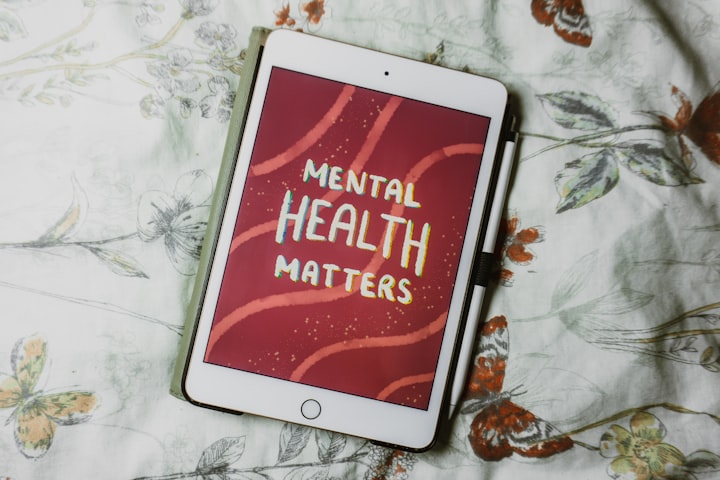Mental Health Issues
By: Mahpara Mukhtar | Date: June 18, 2023

Having the best mental health for oneself is a great way to start a day and live a healthy and happy lifestyle. It is how people are able to interact with one another. The mental state that a person is in shows how they can manage stress. "Mental health disorders are characterized by issues regarding mood, thoughts, and behavior. They may also be referred to as psychological disorders, mental illnesses, and mental health conditions" (Smith, 2022). Another way of characterizing what mental health is through WHO's definition of what it is. According to WHO - “Mental health is a state of mental well-being that enables people to cope with the stresses of life, realize their abilities, learn well and work well, and contribute to their community" (Felman and Tee-Melegrito, 2022).
The National Institute of Mental Health (NIMH) estimates that 14.2 million American adults, or 5.6% of the population, had a major psychiatric disorder in 2020.
Types of mental health issues
There are many different types of mental health issues and disorders that are hard to diminish but with the right diagnosis and treatment, the effects of the symptoms are lessened. The common mental health issues/disorders include:
- Anxiety disorders.
- Attention-deficit/hyperactivity disorder (ADHD).
- Autism
- Depression, bipolar disorder, and mood disorders
- Eating disorder
- Anti-Social Personality disorder
- Obsessive Compulsive disorder
- Schizophrenia
- Post-traumatic stress disorder
Symptoms of mental health issues
With a variety of disorders that are placed under mental health issues, there are also a variety of symptoms that are common among them all. These symptoms include:
- Feelings of sadness or isolation
- Changes in sex drive
- Inability to contain anger or irritability
- Sudden mood changes
- Inability to perceive what is reality
- Trouble concentrating or sleeping
- Extensive worrying
- Suicidal thoughts or self-injury
Causes
Trouble throughout childhood
A growing kid's mental and physical health are greatly impacted by traumatic childhood events such child abuse, parental loss, parental separation, and parental sickness, according to a number of studies. Various psychotic illnesses have been linked to childhood trauma, negative experiences, and other factors. Post-traumatic stress disorder (PTSD) is also more likely to develop as a result of these events.
Biological factors
According to the NIMH, some genes and gene variations place a person at increased risk of developing mental health issues, hence genetic family history may raise the possibility of these conditions. However, this does not mean that a certain genetic may be a cause for the disorders. Cancer, diabetes, and chronic pain are examples of underlying physical health issues that can lead to chronic stress and mental health diseases like melancholy and anxiety. Another reason for causes of these disorders is through the developmental problems a child may have during their childhood.
Treatment for mental health issues
Medication - many of the mental illness that are developed respond really well to medications like anti-depressants and anti-psychotics. The person taking these may feel less symptoms as a result of these medications altering the chemistry in your brain.
Psychotherapy - one-on-one sessions with a healthcare professional or group sessions are also options for psychotherapy. A type of psychotherapy is cognitive behavioral therapy (CBT). It concentrates on assisting you in altering unfavorable habits of conduct and mind.
Brain-stimulation therapies - not all problems get better with medicine. Your doctor could suggest brain stimulation therapy if such is the case. These procedures alter how nerves and other brain cells process chemicals and react to stimuli. Transcranial magnetic stimulation (TMS) and electroconvulsive treatment are two examples.
Summary
Overall, mental health is something that not only related to one's disorder or mental wellbeing but also a person's cognitive, behavioral, and emotional well-being. Additionally, it refers to the capacity to control already-existing problems and stresses while preserving long-term wellbeing and joy.
These disorders make it difficult to function in daily life; but getting the right diagnosis and treatment is not so hard either. Through getting the right therapist, they might help you in getting the right medicine and therapy for your disorder. Either way, they may help you lessen the effects of your symptoms. Just remember that your loved ones and close friends are here to support you no matter what.
References:
Elmer, J. (2019). Find a Therapist and Mental Health Support. [online] Psych Central. Available at: https://psychcentral.com/health/find-help#recap [Accessed: 18 Jun. 2023].
Cleveland Clinic (2022). Mental Health Disorders: Types, Diagnosis & Treatment Options. [online] Cleveland Clinic. Available at: https://my.clevelandclinic.org/health/diseases/22295-mental-health-disorders [Accessed: 18 Jun. 2023].
Felman, A. and Tee-Melegrito, R.A. (2022). Mental health: Definition, common disorders, early signs, and more. [online] www.medicalnewstoday.com. Available at: https://www.medicalnewstoday.com/articles/154543#summary [Accessed: 18 Jun. 2023].





Comments
There are no comments for this story
Be the first to respond and start the conversation.